Working Papers
For submission of articles or Working Papers to CEsA, please send an email to:
comunicacao@cesa.iseg.ulisboa.pt
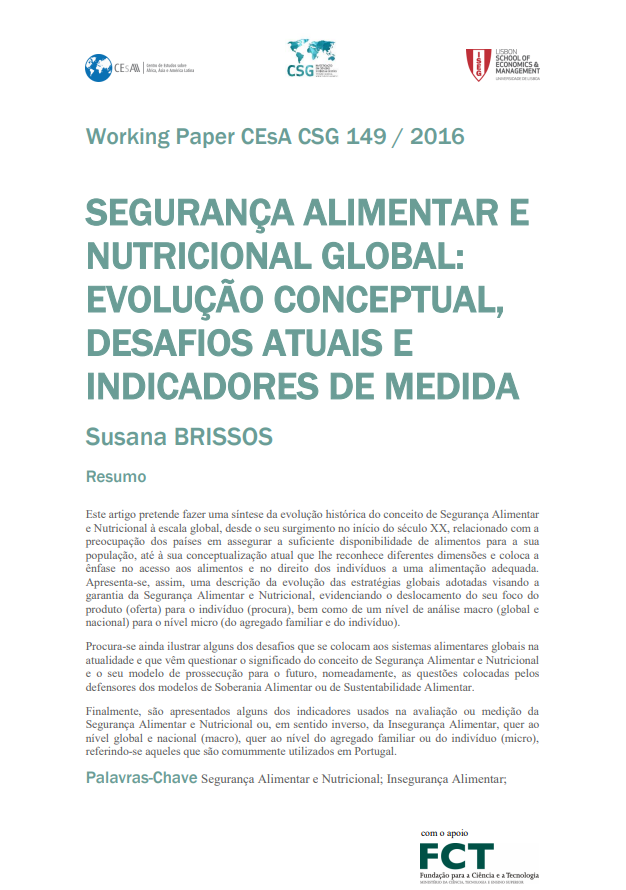
Working Paper 149/2016: Segurança alimentar e nutricional global: evolução conceptual, desafios atuais e indicadores de medida
Abstract:
Segurança alimentar e nutricional global: evolução conceptual, desafios atuais e indicadores de medida summarizes the historical evolution of the concept of Food and Nutrition Security on a global scale, since its emergence in the early 20th century, related to countries’ concern to ensure sufficient food availability for their population, until its current setting which acknowledges different dimensions and puts the emphasis on access to food and the right of individuals to adequate food. It presents a description of the evolution of the global strategies adopted to guarantee Food and Nutrition Security, showing the shift of its focus from the product (supply) to the individual (demand), as well as from the macro (global and national) to the micro level of analysis (household and individual). It also seeks to illustrate some of the challenges facing today’s global food systems and to question the meaning of the concept of Food and Nutrition Security and its model for future pursuit, namely the questions posed by proponents of Food Sovereignty or Food Sustainability. Finally, we present some of the indicators used in the evaluation or measurement of Food and Nutrition Security or, conversely, Food Insecurity, both at the global and national (macro) level, and at the household or individual (micro) level, referring to those that are commonly used in Portugal.
Quotation:
Brissos, Susana (2016). “Segurança alimentar e nutricional global: evolução conceptual, desafios atuais e indicadores de medida”. Instituto Superior de Economia e Gestão – CEsA/CSG Documentos de Trabalho nº 149/2016
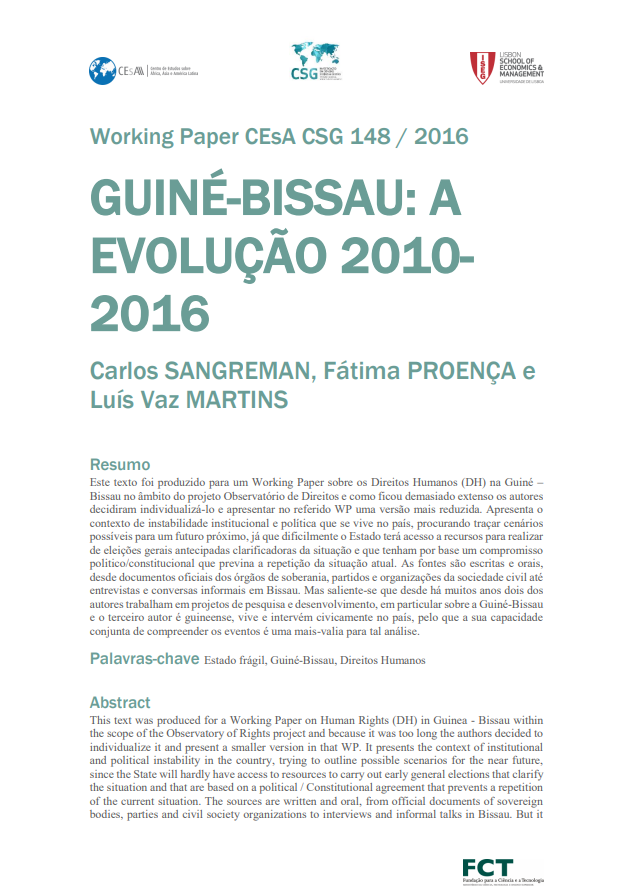
Working Paper 148/2016: Guiné-Bissau: a evolução 2010-2016
Abstract:
Guiné-Bissau: a evolução 2010 – 2016 was produced for a Working Paper on Human Rights (DH) in Guinea – Bissau within the scope of the Observatory of Rights project and because it was too long the authors decided to individualize it and present a smaller version in that WP. It presents the context of institutional and political instability in the country, trying to outline possible scenarios for the near future, since the State will hardly have access to resources to carry out early general elections that clarify the situation and that are based on a political / Constitutional agreement that prevents a repetition of the current situation. The sources are written and oral, from official documents of sovereign bodies, parties and civil society organizations to interviews and informal talks in Bissau. But it should be pointed out that for many years two of the authors have been working on research and development projects, particularly on Guinea-Bissau, and the third author is Guinean, lives and intervenes in the country, for which his joint capacity to understand the is an asset to such an analysis.
Quotation:
Sangreman, Carlos, Fátima Proença e Luíz Vaz Martins (2016). “Guiné-Bissau: a evolução 2010 – 2016”. Instituto Superior de Economia e Gestão – CEsA/ CSG – Documentos de Trabalho nº 148/2016.
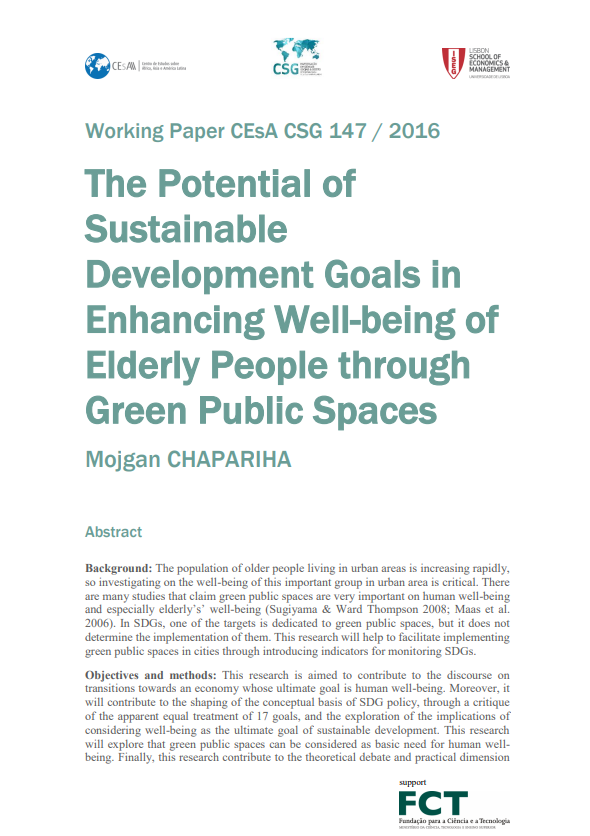
Working Paper 147/2016: The potential of sustainable development goals in enhancing well-being of elderly people through green public spaces
Abstract:
Background: The population of older people living in urban areas is increasing rapidly, so investigating on the well-being of this important group in urban area is critical. There are many studies that claim green public spaces are very important on human well-being and especially elderly’s’ well-being (Sugiyama & Ward Thompson 2008; Maas et al. 2006). In SDGs, one of the targets is dedicated to green public spaces, but it does not determine the implementation of them. The potential of sustainable development goals in enhancing well-being of elderly people through green public spaces will help to facilitate implementing green public spaces in cities through introducing indicators for monitoring SDGs. Objectives and methods: This research is aimed to contribute to the discourse on transitions towards an economy whose ultimate goal is human well-being. Moreover, it will contribute to the shaping of the conceptual basis of SDG policy, through a critique of the apparent equal treatment of 17 goals, and the exploration of the implications of considering well-being as the ultimate goal of sustainable development. This research will explore that green public spaces can be considered as basic need for human well- being. Finally, this research contribute to the theoretical debate and practical dimension of measuring progress towards SDGs, through the more specific case of Green Public Space (GPS) as a target of SDG-11. Results: • Transition towards an economy based on well-being through Herman Daly “ends-means continuum” is crucial for human well-being. • SDG agenda have apparent equal treatment with 17 goals that leads to weak sustainability and finally cannot bring about well-being. • GPS can be considered as basic need for human well-being that is crucial for enhancing elderly peoples’ well-being. • Three indicators introduced to enhance the implementation and monitoring of the GPSs in the context of SDG-11.
Abstract:
Chapariha, Mojgan (2016). “The potential of sustainable development goals in enhancing well-being of elderly people through green public spaces”. Instituto Superior de Economia e Gestão – CEsA/ CSG – Documentos de Trabalho nº 147/2016.
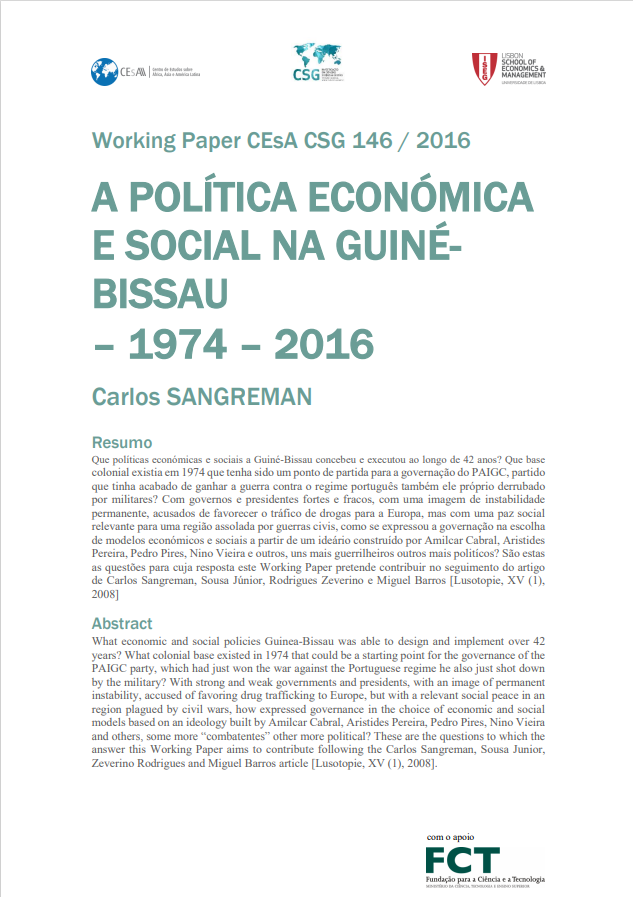
Working Paper 146/2016: A política económica e social na Guiné-Bissau – 1974-2016
Resumo:
The object of analysis of A política económica e social na Guiné-Bissau – 1974 – 2016 are the economic and social policies followed by the different Guinean governments from 1974 to 2016, with a note to the previous colonial period in the 20th century, how they were conceived, approved and put into practice. What economic and social policies did Guinea-Bissau design and implement over 42 years? What colonial base existed in 1974 that was a starting point for the governance of the PAIGC, a party that had just won the war against the Portuguese regime also itself overthrown by the military? With strong and weak governments and presidents, with an image of permanent instability, accused of favouring drug trafficking to Europe, but with a relevant social peace for a region ravaged by civil wars, how did governance express itself in the choice of economic and social models based on an ideology constructed by Amilcar Cabral, Aristides Pereira, Pedro Pires, Nino Vieira and others, some more guerrilla fighters, others more political? These are the questions to whose response this Working Paper intends to contribute following the article by Carlos Sangreman, Sousa Júnior, Rodrigues Zeverino and Miguel Barros [Lusotopie, XV (1),2008].
Citação:
Sangreman, Carlos (2016). “A política económica e social na Guiné-Bissau – 1974 – 2016”. Instituto Superior de Economia e Gestão – CEsA/ CSG – Documentos de Trabalho nº 146/2016.
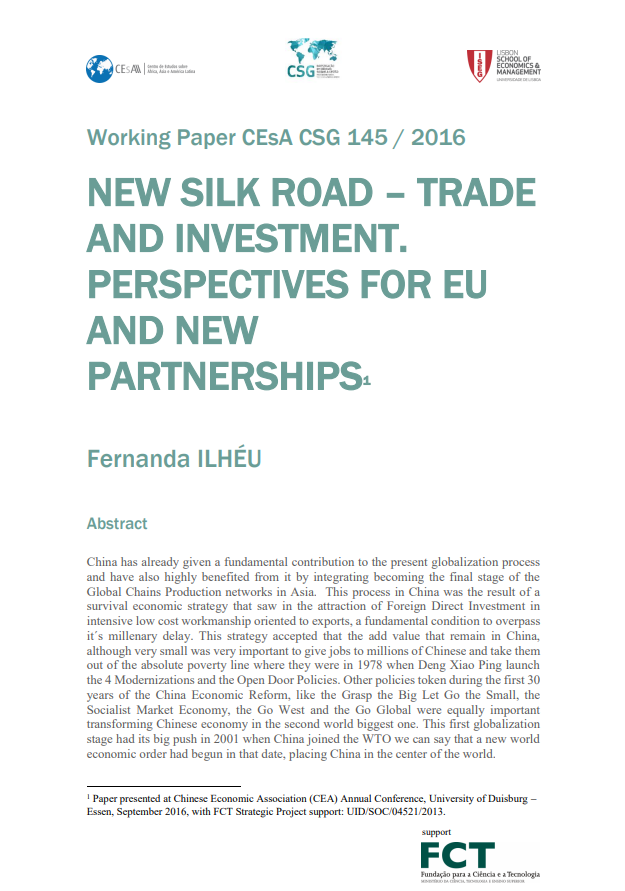
Working Paper 145/2016: New silk road: trade and investment. perspectives for eu and new partnerships
Abstract:
New silk road: trade and investment. perspectives for eu and new partnerships talks about how China has already given a fundamental contribution to the present globalization process and have also highly benefited from it by integrating becoming the final stage of the Global Chains Production networks in Asia. This process in China was the result of a survival economic strategy that saw in the attraction of Foreign Direct Investment in intensive low cost workmanship oriented to exports, a fundamental condition to overpass it´s millenary delay. This strategy accepted that the add value that remain in China, although very small was very important to give jobs to millions of Chinese and take them out of the absolute poverty line where they were in 1978 when Deng Xiao Ping launch the 4 Modernizations and the Open Door Policies. Other policies token during the first 30 years of the China Economic Reform, like the Grasp the Big Let Go the Small, the Socialist Market Economy, the Go West and the Go Global were equally important transforming Chinese economy in the second world biggest one. This first globalization stage had its big push in 2001 when China joined the WTO we can say that a new world economic order had begun in that date, placing China in the center of the world.
Quotation:
Ilhéu, Fernanda (2016). “New silk road: trade and investment. perspectives for eu and new partnerships”. Instituto Superior de Economia e Gestão – CEsA/ CSG –Documentos de Trabalho nº 145/2016
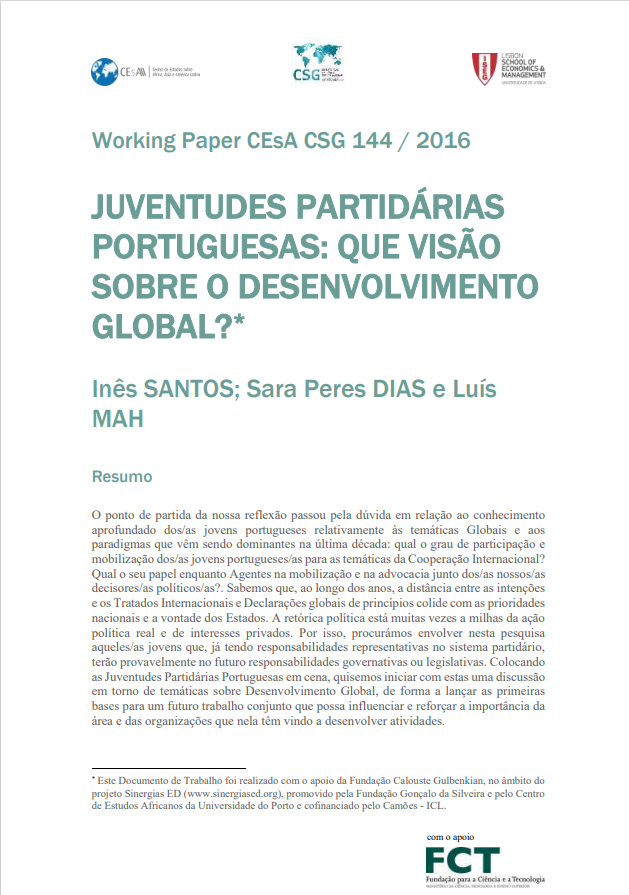
Working Paper 144/2016: Juventudes partidárias portuguesas: que visão sobre o desenvolvimento global?
Abstract:
The starting point of Juventudes partidárias portuguesas : que visão sobre o desenvolvimento global? was the doubt regarding the in-depth knowledge of Portuguese young people regarding Global themes and the paradigms that have been dominant in the last decade: what is the degree of participation and mobilization of Portuguese young people to the themes of International Cooperation? What is your role as Agents in mobilizing and advocating for our policy makers? We know that, over the years, the distance between intentions and International Treaties and global Declarations of Principles collides with national priorities and the will of States. Political rhetoric is often miles from real political action and private interests. Therefore, we sought to involve in this research those young people who, already having representative responsibilities in the party system, will probably have governmental or legislative responsibilities in the future. Putting the Portuguese Party Youth on the scene, we wanted to start with them a discussion around Global Development themes, in order to lay the first bases for a future joint work that can influence and reinforce the importance of the area and the organizations that have been coming to it. to develop activities.
Quotation:
Santos, Inês, Sara Peres Dias e Luís Mah (2016). “Juventudes partidárias portuguesas : que visão sobre o desenvolvimento global?”. Instituto Superior de Economia e Gestão – CEsA / CSG – Documentos de Trabalho nº 144/2016.
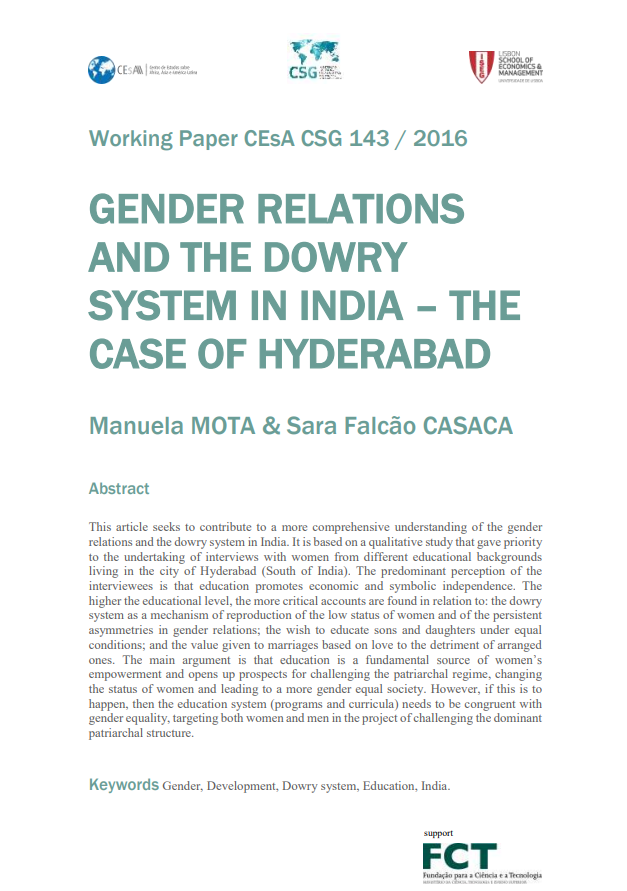
Working Paper 143/2016: Gender relations and the dowry system in India: the case of Hyderabad
Abstract:
This article seeks to contribute to a more comprehensive understanding of the gender relations and the dowry system in India. It is based on a qualitative study that gave priority to the undertaking of interviews with women from different educational backgrounds living in the city of Hyderabad (South of India). The predominant perception of the interviewees is that education promotes economic and symbolic independence. The higher the educational level, the more critical accounts are found in relation to: dowry as a mechanism of reproduction of the low status of women and of the persistent asymmetries in gender relations; the wish to educate sons and daughters under equal conditions; and the value given to marriages based on love to the detriment of arranged ones. The main argument is that education is a fundamental source of women’s empowerment and opens up prospects for challenging the patriarchal regime, changing the status of women and leading to a more gender equal society. However, if this is to happen, then the education system (programs and curricula) needs to be congruent with gender equality, targeting both women and men in the project of challenging the dominant patriarchal structure.
Quotation:
Mota, Manuela e Sara Falcão Casaca (2016). “Gender relations and the dowry system in India: the case of Hyderabad”. Instituto Superior de Economia e Gestão – CEsA/ CSG – Documentos de Trabalho nº 143/2016.
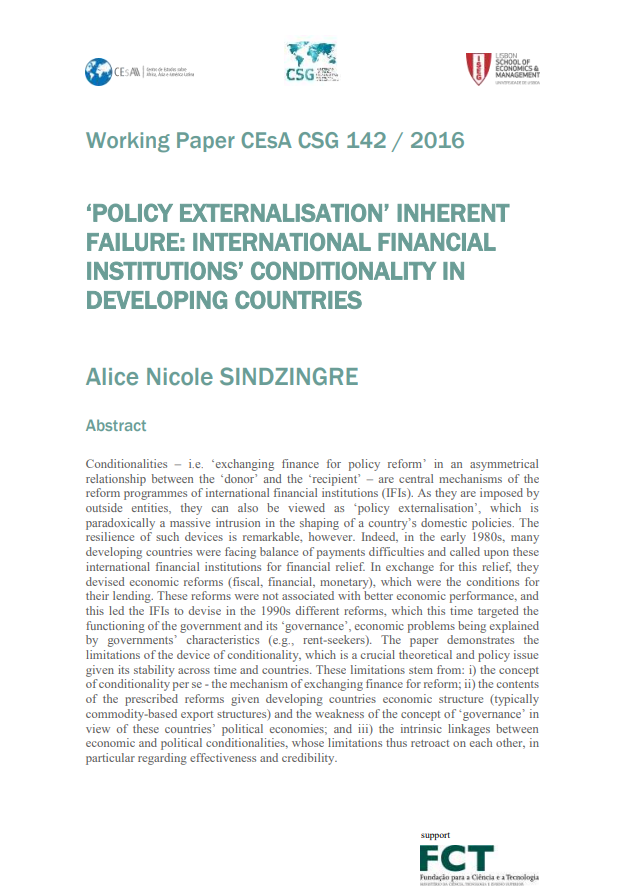
Working Paper 142/2016: ‘Policy externalisation’ inherent failure: international financial institutions’ conditionality in developing countries
Abstract:
Conditionalities – i.e. ‘exchanging finance for policy reform’ in an asymmetrical relationship between the ‘donor’ and the ‘recipient’ – are central mechanisms of the reform programmes of international financial institutions (IFIs). As they are imposed by outside entities, they can also be viewed as ‘policy externalisation’, which is paradoxically a massive intrusion in the shaping of a country’s domestic policies. The resilience of such devices is remarkable, however. Indeed, in the early 1980s, many developing countries were facing balance of payments difficulties and called upon these international financial institutions for financial relief. In exchange for this relief, they devised economic reforms (fiscal, financial, monetary), which were the conditions for their lending. These reforms were not associated with better economic performance, and this led the IFIs to devise in the 1990s different reforms, which this time targeted the functioning of the government and its ‘governance’, economic problems being explained by governments’ characteristics (e.g., rent-seekers). Policy externalisation’s inherent failure: international financial institutions’ conditionality in developing countries demonstrates the limitations of the device of conditionality, which is a crucial theoretical and policy issue given its stability across time and countries. These limitations stem from: i) the concept of conditionality per se – the mechanism of exchanging finance for reform; ii) the contents of the prescribed reforms given developing countries economic structure (typically commodity-based export structures) and the weakness of the concept of ‘governance’ in view of these countries’ political economies; and iii) the intrinsic linkages between economic and political conditionalities, whose limitations thus retroact on each other, in particular regarding effectiveness and credibility.
Quotation:
Sindzingre, Alice Nicole (2016). ‘Policy externalisation’s inherent failure: international financial institutions’ conditionality in developing countries”. Instituto Superior de Economia e Gestão – CEsA/ CSG – Documentos de Trabalho nº 142/2016.
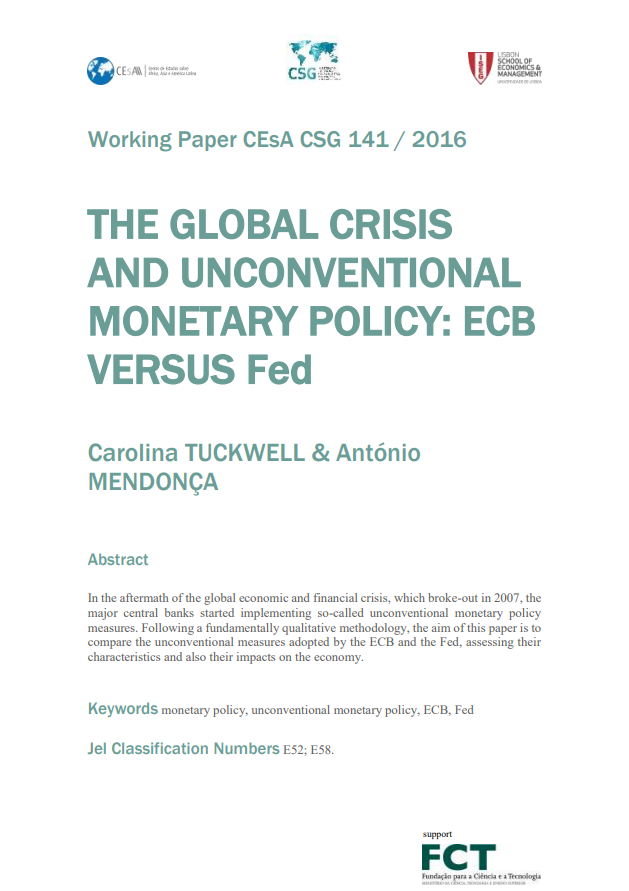
Working Paper 141/2016: The global crisis and unconventional monetary policy: ECB versus Fed
Abstract:
The global financial crisis arose in August of 2007, as a result of the burst of the housing bubble in the US, and then spread to the euro area – where it took the form of a sovereign debt crisis after 2010 – and to the rest of the globe. In its aftermath, the major central banks, such as the ECB and the Fed, started implementing the so-called unconventional monetary policy measures, as a response. The major aim of The global crisis and unconventional monetary policy: ECB versus Fed is to compare the unconventional measures adopted by these two central banks. The unconventional measures referred to will be those that are not part of the conventional monetary policy tools of each bank and that were specifically used to address the global financial crisis and the sovereign debt crisis. Concerning the specific objectives of this paper, firstly, it aims to assess the formal and conceptual differences between the unconventional measures adopted by both central banks. This includes understanding how the measures themselves differ from bank to bank and what their aims and areas of intervention are. Additionally, the intent of the unconventional measures in simply aiding the transmission of the monetary policy stance, or as a form of further stimulating the economies is also considered. The final aspect of the formal and conceptual comparison includes determining how these measures fit in the concepts of “quantitative easing” and “credit easing”. In connection to those concepts, the paper also intends to compare the impacts of these unconventional measures on the balance sheet of each bank, both in quantitative terms (size) and qualitative terms (composition).
Quotation:
Tuckwell, Carolina e António Mendonça (2016). “The global crisis and unconventional monetary policy: ECB versus Fed”. Instituto Superior de Economia e Gestão – CEsA/ CSG – Documentos de Trabalho nº 141/2016.
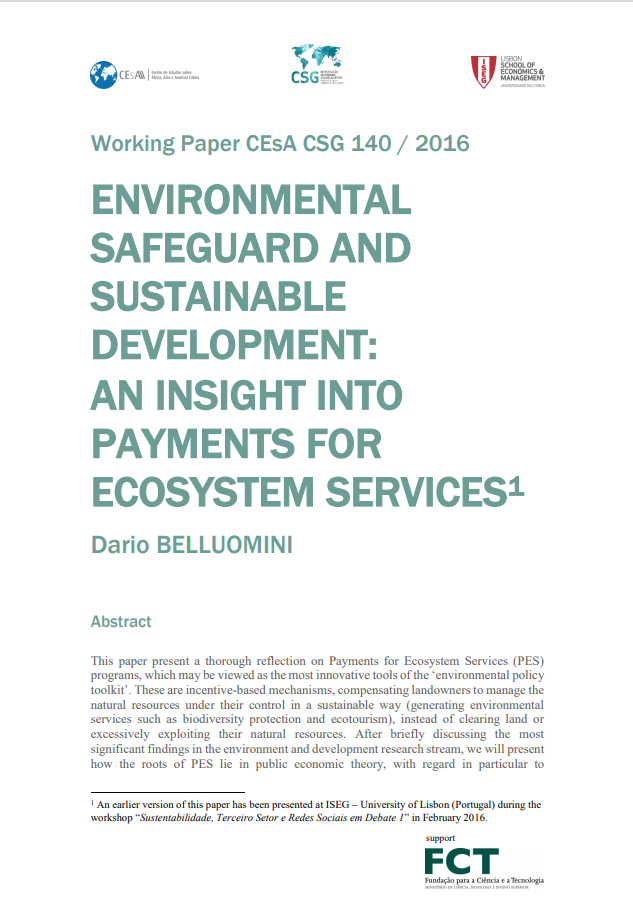
Working Paper 140/2016: Environmental safeguard and sustainable development: an insight into payments for ecosystem services
Abstract:
Environmental safeguard and sustainable development: an insight into payments for ecosystem services presents a thorough reflection on Payments for Ecosystem Services (PES) programs, which may be viewed as the most innovative tools of the ‘environmental policy toolkit’. These are incentive-based mechanisms, compensating landowners to manage the natural resources under their control in a sustainable way (generating environmental services such as biodiversity protection and ecotourism), instead of clearing land or excessively exploiting their natural resources. After briefly discussing the most significant findings in the environment and development research stream, we will present how the roots of PES lie in public economic theory, with regard in particular to environmental externalities. Later, after debating the proper definition of PES and its main concepts (e.g. additionality, perverse incentives, conditionality), we shall also comment the main case-studies on the topic, in order to provide clear examples of how these instruments may be applied in several different context (i.e. both in developing and developed countries, either by public or private agents). As it shall be shown, given their high adaptability to local conditions, PES are likely to become extremely important in next decades’ environment safeguard interventions.
Quotation:
Belluomini, Dario (2016). “Environmental safeguard and sustainable development: an insight into payments for ecosystem services”. Instituto Superior de Economia e Gestão – CEsA/CSG Documentos de Trabalho nº 140-2016.





